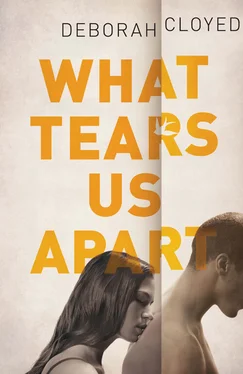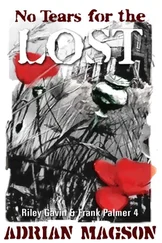GOD’S BEEN RAINING kerosene.
Ita watches the flames clawing the night sky. When he tries to force air into his iron lungs, ash coats his tongue, clogs his throat. He doubles over, hands on his knees, and feels his body heave with vomit. But when he opens his mouth, it’s blood that drools onto his foot. He coughs, and blood splatters the dirt. Ita wonders if his wounds will prove fatal after all.
He must make it back to the orphanage. He must find a hold on the present. All is lost for him, but the boys deserve a chance.
He nearly faints from the pain of standing, but grits his teeth and thrusts one foot in front of the other. He’ll keep to the alleys—he can hear the rioters out on the main paths. He creeps unsteadily between the homes, his back scraping along the mud shacks. From inside them, he hears the chorus of whispers—plotting, pleading, praying.
One more corner and he’ll be there. The fire is behind him; it hasn’t reached their neighborhood. He realizes, with a pang of shame, that he dreads seeing the children. He dreads their questions, their tears, their bulging eyes. Ita doesn’t have any comfort to give. He’s afraid if he opens his mouth, he might tell them the truth.
The life we have been building, the one I wanted to give you, planned so carefully—it’s over.
When Ita knocks quietly on the door, there is an instant rustle.
A tiny whisper asks who’s out there. Michael.
As soon as Ita answers, the door slides open.
Michael’s eyes go wide as cashew nuts, and Ita realizes he must look as monstrous as he feels.
“Jomo?” Ita asks.
Michael nods.
Ita sighs. He is safe. Jomo is inside and safe. Ita drags his swollen body inside.
Michael watches with his ancient eyes. “All the children are in bed. Mary, too. I told them they must stay there until you returned.” Pride peeks through Michael’s scared voice. Ita sees that the boy is clutching Ita’s rifle. He floods with tenderness for this boy whom he has promised so much.
“You did very well, Michael. I knew I could count on you. You must sleep now. I will need your help in the morning.”
“But—” Michael darts another look at Ita’s wounds.
Ita puts out his hand, takes the rifle. “I’ll be okay. I can fix it.” He nods toward the secret room. But he has no idea if he can fulfill that promise, if he can fix anything this night has destroyed. “Go on,” he says in a voice he knows Michael will obey.
Michael sighs, the same old man’s sigh he had when he was five years old. “Lala salama, mpwenda baba.” He says it so softly as he turns to leave that it takes Ita a moment to realize what he’s heard.
Goodnight, dear father.
Ita watches him enter the bedroom, then begins the painful trudge toward the room with the medical supplies. Leda’s room.
There are footsteps again in the courtyard at his back, scurrying, urgent.
“Ita—” Mary’s whisper hisses into the night.
Ita turns. Mary’s face is crinkled paper, soggy in the creases.
Her family, he realizes with a pang. The orphans are not her family, not like they are for Ita. Mary’s kin is out there, in the chaos, in the fire. Her daughter, Grace, lives by the railroad tracks with her husband, with Mary’s grandchildren. But Mary is here. She stayed. “Thank you, Mary. Thank you for staying with the boys. What can I do? Do you need me to go check on your family?”
A tear winds crookedly through the wrinkles of Mary’s face. Ita realizes he has never seen Mary cry, not even close. She’s looking at his battered body. “You cannot. Look at you. What did they do to you? Where is Leda?”
“She is gone.” But Ita has no words for what happened to him, because it is linked to what happened to Leda, to what Chege did. He wonders when he will be able to say it aloud, if ever. Dizziness rolls over Ita like fog. He pitches forward, his stomach heaving into his throat.
Mary scuttles toward him, grips his shoulder.
Ita recoils from the pain. He must stand. He must reassure her, if he wants to be alone. “It’s okay. In the morning—”
“No, I must go now. My daughter—”
He shakes his head firmly. “No. You cannot go out tonight. It is not safe for women.”
More tears seep into Mary’s scrunched face.
But Ita must be firm on this. He cannot go back out there now and hope to protect an old woman. “Does Paul have a phone?” Ita asks of Mary’s son-in-law, taking out his cell phone.
Mary shakes her head.
Ita nods. “I’ll go with you tomorrow. We will walk in the sun, in the light that has to follow this darkness. Grace will be all right. She’s strong and brave. Like her mother.”
Mary understands. Ita has decided. She stops her lip from trembling. Then she reaches up and puts her hand gingerly to the side of Ita’s face. He closes his eyes and the scratchy parchment of her hand on his cheek brings the flicker of a memory, decades old. A mother’s touch. If he doesn’t open his eyes, he will disappear into the sensation, spiral into the void, searching for solace in memories lost and drained away.
His eyes fling open when Mary’s hand slips away. Without another word, she turns and shuffles off to her room to spend a sleepless night.
The moment of comfort evaporates, and Ita knows he might collapse any minute. He hastens across the courtyard to the hidden room.
Inside, he lights an oil lamp. He sees the pile on the floor, but wrests his mind away from thoughts of Leda, of the memories in this room. Instead, he looks at himself in the small mirror.
At the first glimpse of his face, Ita sees a statue glued back together all wrong. His eyes, nose, jaw—everything’s in the wrong place and wrong proportions. The swelling—that explains why his vision is so distorted, why his head pounds like a pump about to blow.
The only other time he has ever seen his face like this, a mangled toy to be thrown away...
The only other time was the day he met Chege. The day one life ended and another began.
Ita soaks a rag in a bowl of water. He presses it to his forehead, covering his eyes, covering the vision, and tries not to remember.
But everything—the blood coating his teeth, the pain in his limbs as though they’re clenched in a lion’s jaw, the hopelessness flooding his veins—it’s all so much the same that Ita can’t help but remember...
September 22, 1989, Kibera—Ita
Ita hears them, the boys, he hears them coming, but he doesn’t care.
After two weeks on the streets, he is already tired. He’s tired of running, tired of begging, tired of trying to hold on to a life that’s bent on wriggling out of his fingers like a worm. So, let it. Let it all go. Mother. Home. School. Hope. He hears the boys tearing down the alley, their footsteps the sound of his plans being trampled.
When the boys turn the corner, Ita sees they are older than he’d expected. Teenagers.
There is a moment where they stop and Ita looks up and they look at him and there is still a thread of time in the fabric of fate when they might just move on.
But then one of them spots Ita’s backpack. And when he nudges the boy next to him, that boy looks at Ita’s shoes. And then the third boy, the tallest, with a tattoo freshly done, he rallies them all with a certain look. Seconds later, as though choreographed, they all jump Ita.
The tall boy is the fists. He likes it, Ita can tell. He likes beating him, likes beating anyone, probably, maybe because he’s holding in the same bellyful of seesaw emotions as Ita. This way, when his knuckles crack on Ita’s cheekbones and his knees make Ita’s ribs pop, some of the feelings can get out and away, and leave space for him to breathe again.
That’s what Ita hears the loudest—the boy’s breathing, heavy in his ear. But that doesn’t mean he can’t hear the other boys unzip his backpack. He can hear them celebrating the spoils, tossing out the books as they find the food and clothes, the medicine. Ita can hear, just barely he can hear them tell the tall boy to stop, that it looks like he’s dead, stop, he isn’t moving, he’s—
Читать дальше












